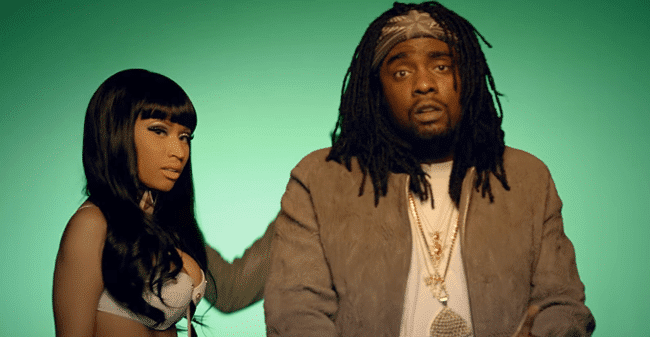
YouTube
Nicki Minaj set the Internet ablaze over the weekend, and it wasn’t because she dropped a new song or video. It happened after she mentioned there were seven white rappers who had songs in the top ten of the US iTunes rap charts.
“It’s a great time to be a white rapper in America, huh?” wrote Nicki in a now deleted post. “These are the top 10 rap songs on US iTunes.”
Some of the rappers who made the chart include Post Malone for his song “Rockstar,” G-Eazy for “Him & I” and Mackelmore for his cut”Good Old Days.”
After Nicki’s post, the social media backlash soon followed.
“So only because you are Black you can be a rapper?” someone tweeted. “This is so racist from Nicki Minaj. Nicki you are sometimes a huge idiot.”
“I have so much to say about this Nicki Minaj statement,” another person wrote. “I’m so tired of hip-hop artist blaming the white man. When will we address our BS [that] we do?”
Nicki then added to the caption of her post and shot back at her critics. She also told them to get off her page if they don’t like what she had to say.
“S/O to Em & Post,” wrote the New York rapper. Two of my faves. Congrats to Em on his new album … Blocking all you sensitive d—- riders. It IS a great time to be a white rapper in America. I wanna sign one for my new label. U know anyone? I speak my motherf—- mind. If you don’t like it GTFO my page, d—- rider. Ya’ll can never wait to ride the queen d—. Sensitive ass IG thugs.”
Related news: Nicki Minaj
Nicki Minaj Visits Brother In Jail … But Only Because of Their Mom
Nicki Minaj Wants to Know Why She Has to Work Twice As Hard to Get Respect As a Female MC
Nicki Minaj Says Fashion Designers Appropriate Hip-Hop Culture and Exclude Black People
That didn’t seem to stop the criticism, however, so Nicki posted an interview between Power 105’s Angie Martinez and J. Cole. During that sit-down, Cole talked about jazz and how it was first dominated by Black artists and how that stopped later on.
At the time of that interview, Cole released his 2014 album “Forest Hills Drive” and was explaining the lyrics on the song called “Fire Squad.” In that cut, he talks about white artists doing traditional Black music throughout the years.
“History repeats itself and that’s just how it goes / Same way these rappers always bite each others flows / Same thing that my n—- Elvis did with Rock and Roll / Justin Timberlake, Eminem and then Macklemore / While silly n—– argue over who gon’ snatch the crown / Look around my n—- / White people have snatched the sound,” he rhymed.
After Nicki posted that Cole interview, Wale jumped into the conversation and stuck up for her. He also used two very popular singers to add to her point.
“See no lies,” he wrote. “White artist’s songs are instantly pop songs and not urban. Miguel got to be ‘urban.’ Sam Smith can be ‘pop’ with the same exact song … Nobody wanna say it, though, because of the backlash. The white artists know it too. They won’t disagree.”
A lot of people agreed with the Washington D.C. rapper and thanked him for sharing his opinion.
“You the truth for this my dude,” one person wrote. “No one wants to talk about the elephant in the room. Glad to see you speaking up on a double standard.”
“Thank you,” another person tweeted. “I’m so glad someone else can see what’s really been going on … We should start the hashtag #giveusbackourculture.”
Jam Donaldson, who’s produced documentaries for BET, spoke on the subject of white rappers thriving in hip-hop and said it’s just not a phase, it’s going to be the norm.
“White artists aren’t just adding to the universe of hip-hop, they are on the way to replacing Black hip-hop artists,” he said. “As the business model has changed, large record companies may feel that a white rapper may be a better bang for their buck.”
As for Nicki, she posted another message about the growing success of white rappers and seemed confused why people were so offended by her initial post.
“Be mad at this too. Onika posts what Onika wants on Onika’s page,” she wrote using her real name. “Anybody who don’t wanna see Onika’s posts should un-follow Onika and stop commenting to or about Onika, ’cause Onika doesn’t know you or care about you … I work in the music business. Therefore, I post on new developments in the music industry. Similar to you, if you work in fiance, you may post on new developments in the finance industry. Whenever a Black woman speaks anything, she’s labeled as ‘mad,’ ‘angry’ [or] ‘bitter.”’


